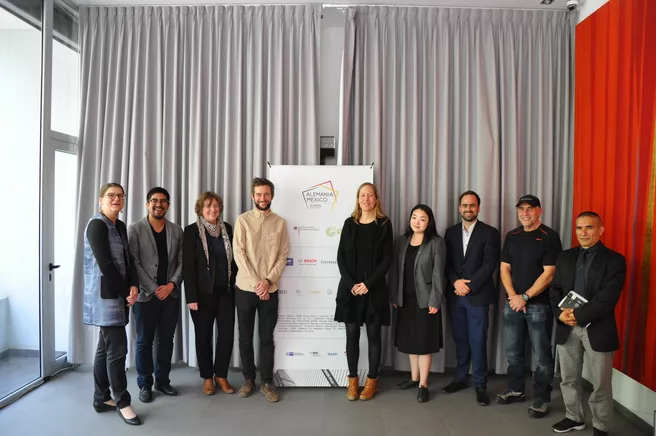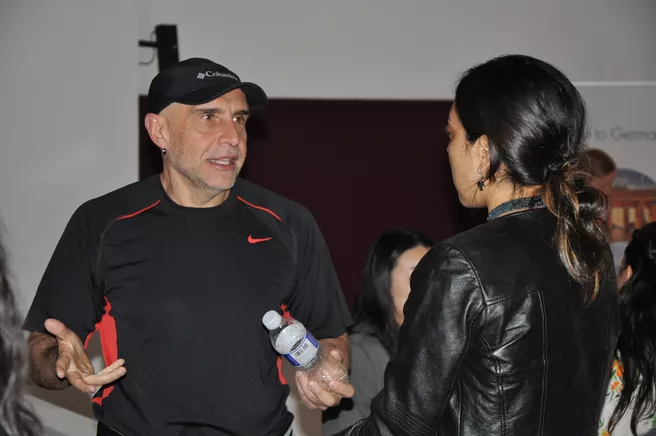Doctoral research and postdoc stays at TUM were the central topics presented and discussed during the two events held in Mexico City by TUM São Paulo together with the FU Berlin Regional Office São Paulo. The project encompassing the two workshops was selected as one out of 18 projects (counting 240 project applications in total) which were funded by the "Año dual Alemania – México 2016 – 2017" – the official title of the German Year in Mexico.
During two afternoons in February 2017 at the Goethe Institute in Mexico City, excellent young scientists received intensive consultation from the workshop organizers TUM and FU Berlin as well as from the partners DAAD, DFG and the Alexander von Humboldt-Foundation. Both events were supported by the TUM Graduate School (TUM GS): Zizheng Zhang, Project Manager International Cooperations & Diversity and responsible for public relations, was actively involved in the preparations and the event support on site.
For the PhD workshop, 35 excellent Mexican candidates with a pronounced interest in a doctorate in Germany were selected among 70 applications. This targeted event was also a novelty for the DAAD marketing director in Mexico, Susanne Faber, who assisted the event preparations and presented he scholarship and support offerings of the DAAD to the Mexican participants.
Background information: Together with the FU Berlin, TUM São Paulo has developed a new event format back then in 2014 for counseling and informing potential doctoral students. This event distinguishes itself by the interaction between the participants and the TUM Graduate School as well as live testimonials (via video conference) – Latin American PhD students who are currently performing their doctoral research at TUM. “How to find a supervisor? How can I contact a possible host?” – the participants can ask these burning questions directly and receive first-hand information. In Mexico for example, TUM Alumna Prof. Dr. Melissa Schumacher (professor of architecture at the Mexican partner university Universidad de las Américas Puebla (UDLAP) and former PhD graduate of the Department of Civil, Geo and Environmental Engineering), gave valuable insights on her personal experiences when graduating in Munich.
The following day, the postdoctoral workshop with about 30 top potential young scientists took place together with the partners DAAD, DFG and AvH. The main goal was to show how a postdoc can be carried out in Germany and specifically at TUM. Zizheng Zhang and Sören Metz presented the TUM offerings in this context, while the TUM Alumnus and Humboldtian Prof. Dr. Luis Vaca Domínguez (biology professor at the Universidad Nacional Autónoma de México (UNAM)) answered all questions and provided advice on applying for a postdoc position at TUM and the AvH scholarships.
Feedback shows that 95% of the participants were very motivated after the event to complete a postdoctoral course in Germany.
Background information: As a logical development of the PhD workshops, the successful format was expanded to reach potential postdoctoral candidates in the Latin American region. In this format, selected candidates exchange ideas with the TUM Talent Factory and Latin American Alumni to learn about funding their stay and applying successfully. In this format, colleagues from the DFG, the DAAD and the AvH participate and present the available funding possibilities.
Scientific project between UDLAP and TUM
Within the framework of the German Year in Mexico, the scientific project between the UDLAP and the TUM in the "Green Belt" in Puebla (located about two hours from Mexico City) was initiated. At TUM, Prof. Valter de Vries (Chair of Land Management) and Dr. Pamela Durán Díaz are the project partners and on the Mexican side the TUM Alumna Prof. Dr. Melissa Schumacher (professor of architecture at the UDLAP) is involved. The “Green Belt” topic was dealt with in several workshops involving students, experts, architects, urbanists and the population during three intensive days. This also attracted the interest of the local press:
http://blog.udlap.mx/blog/2017/03/realizancinturonverdeenlaudlap/
http://www.diariopuntual.com/universitarios/2017/03/06/47137
![[Translate to en:] Fotos Goethe Institut Mexiko](/fileadmin/_processed_/e/3/csm_PhD_15.02_CDMX_DSC_0692_04f52ed763.webp)

